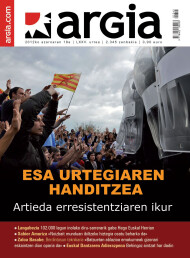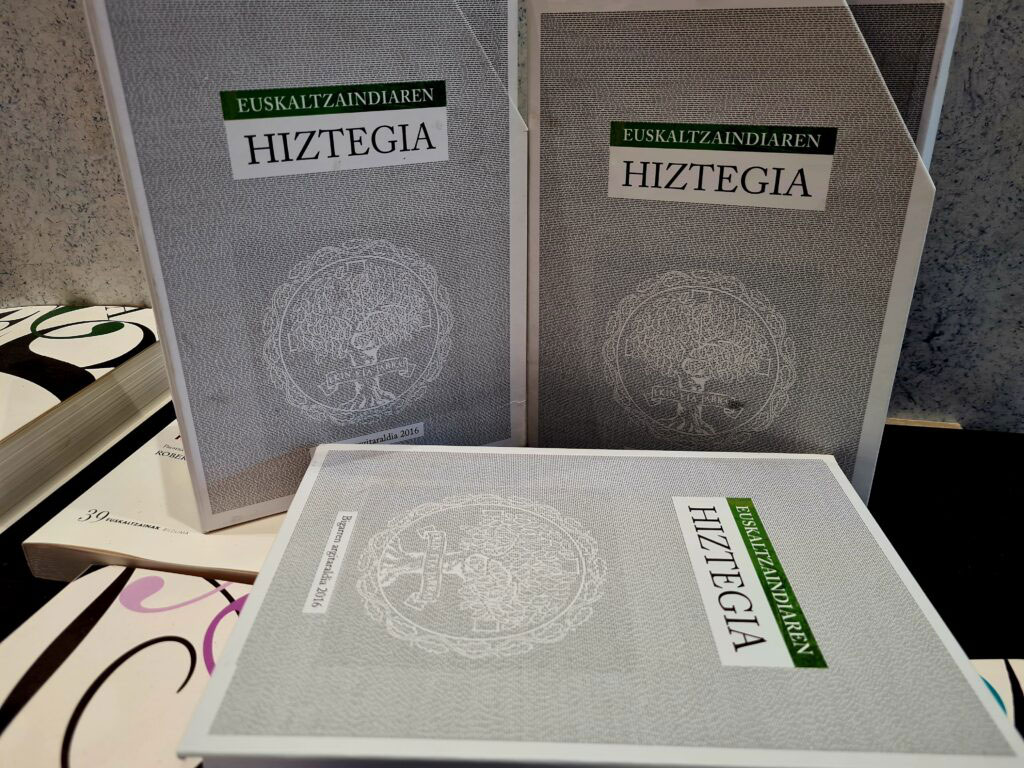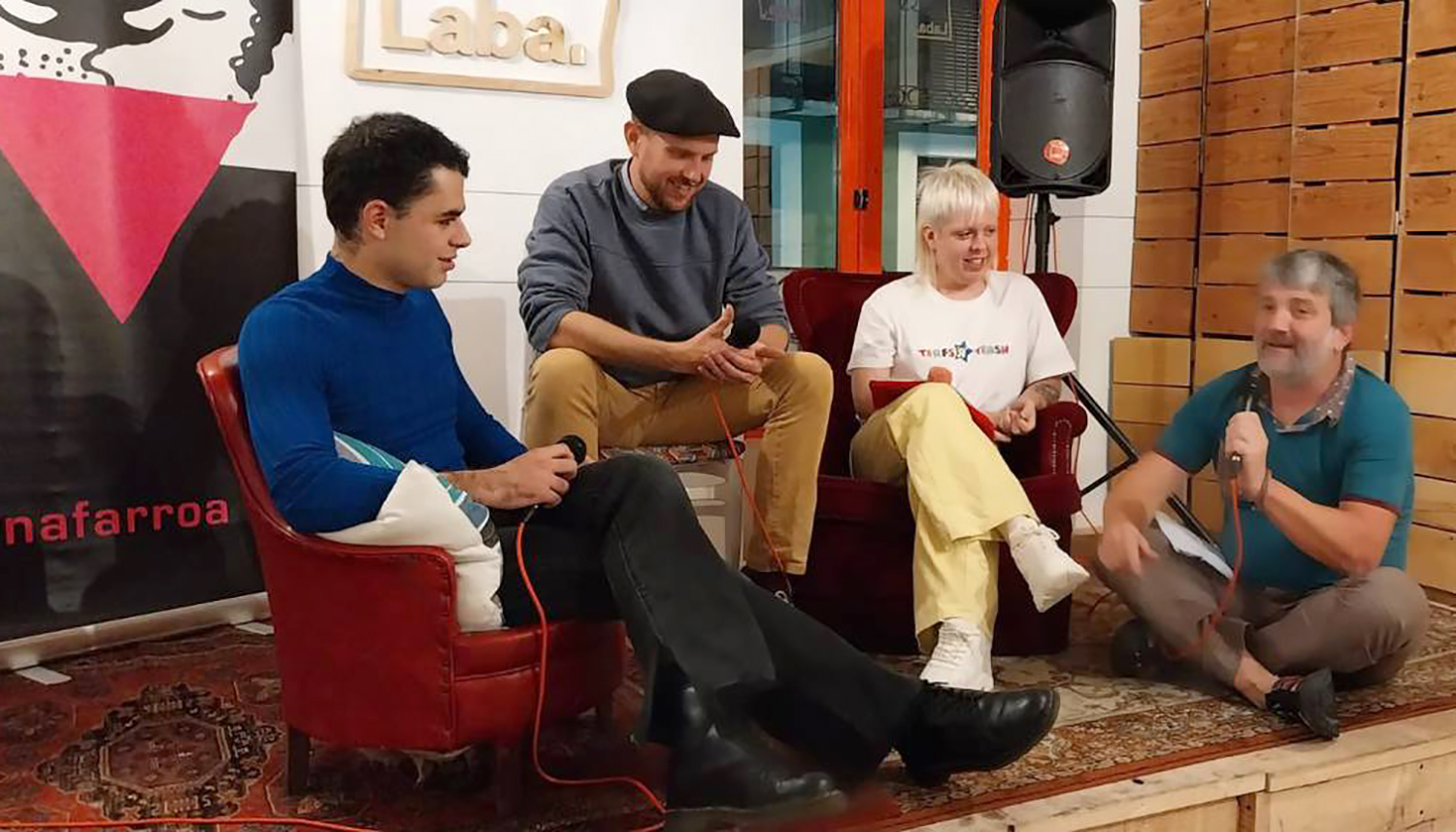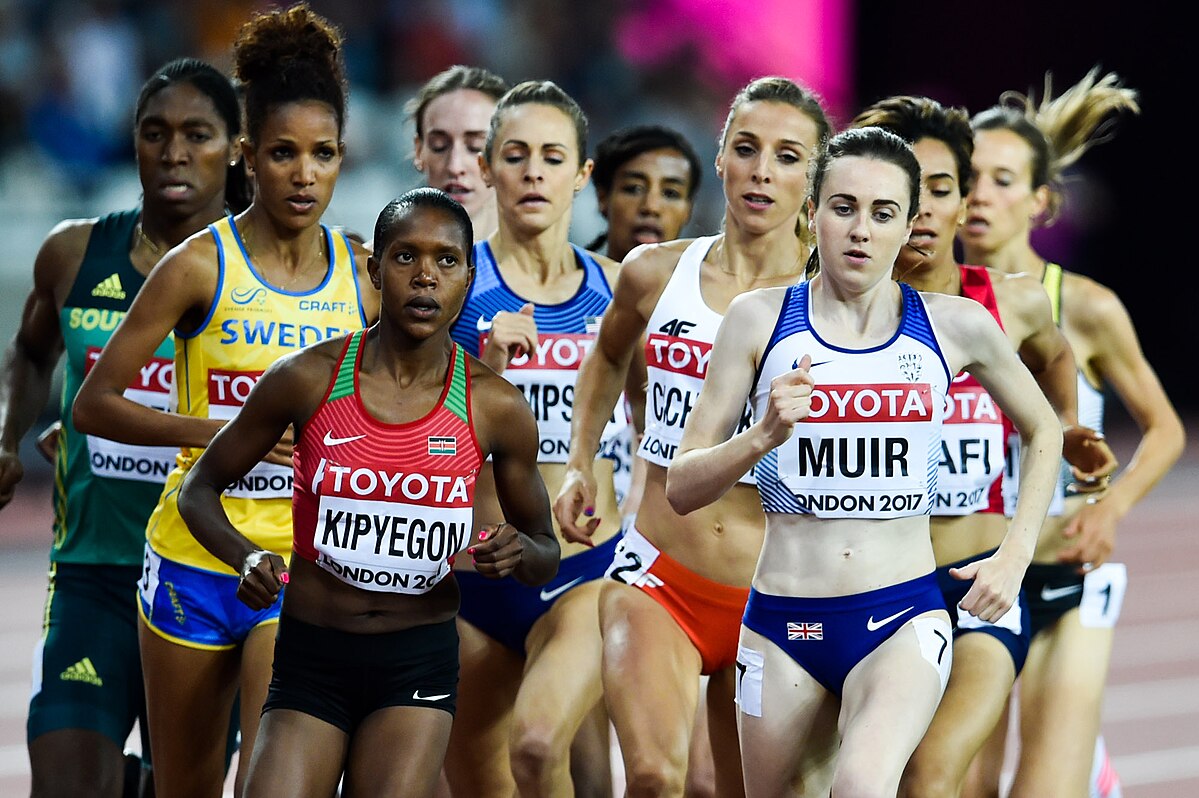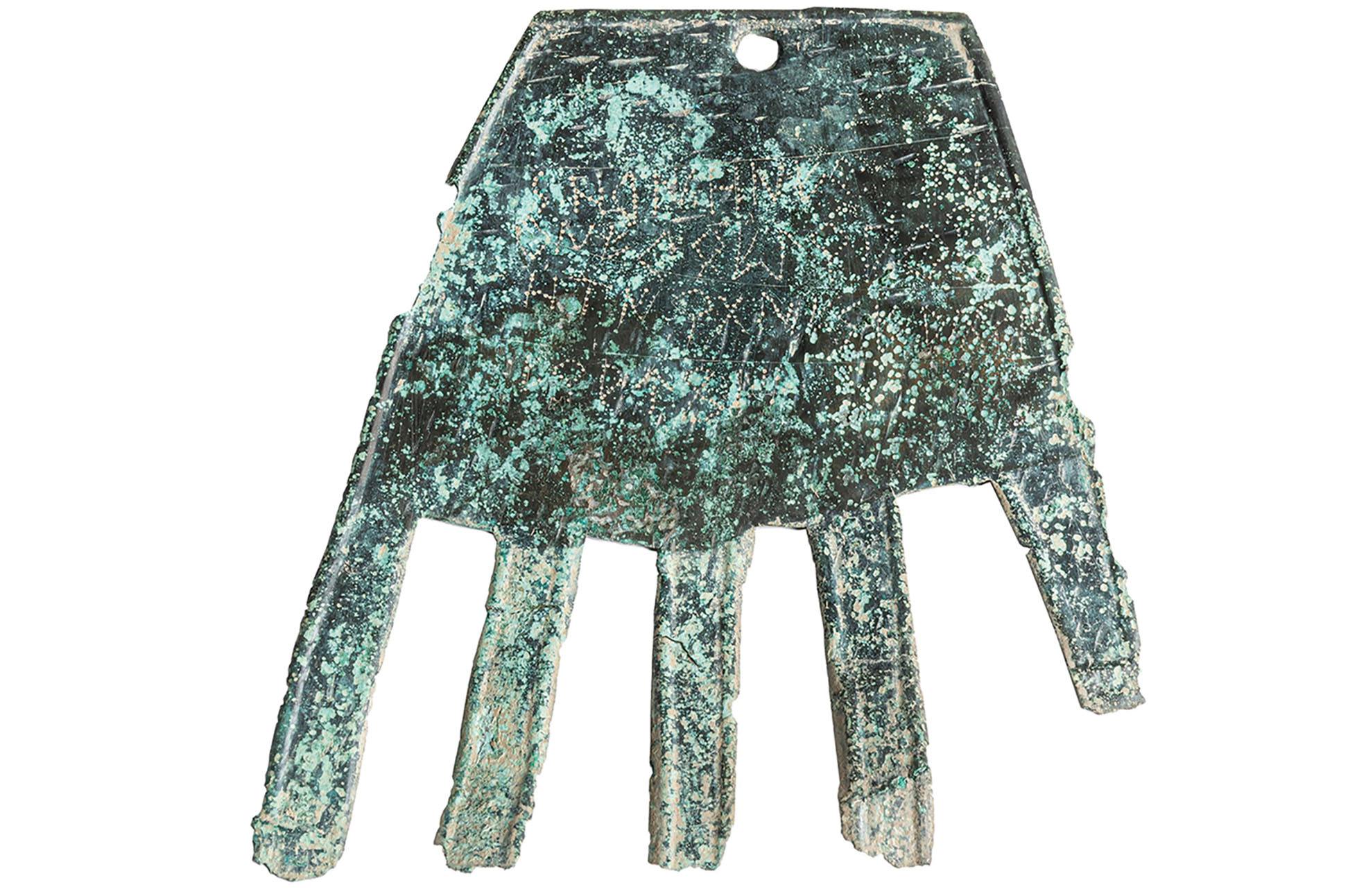"Unified Basque dictionaries are nothing but rustic erasers"
- Two years ago, Xabier Amuriza published the second birth of the Basque Country batua. Now, Seven Evidences for Rebirth (Lanku, 2012), which has been referring to the previous one, always working the “decisive keys” in the direction of the euskera.Con in order to clarify the darkness, the book collects literary readings taken from the 4x4 Opera novel that will be published next year.
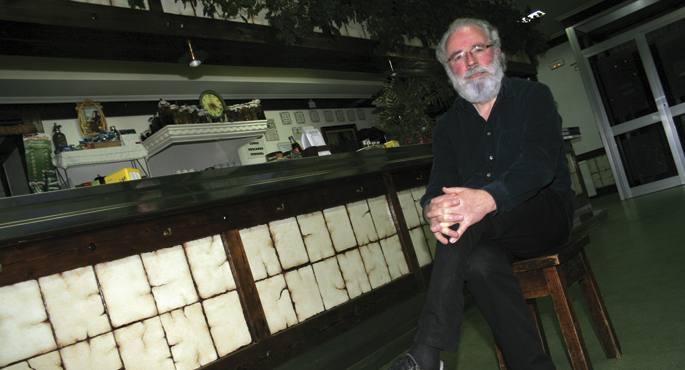
Before the same entry in the book, worthy of mention, yours: “Euskaldunizar Euskal Herria is not only in the hands of the Basques. It is in our hands, and only in ourselves, to develop a competitive language. This can greatly help Euskaldunizar Euskal Herria.” A competitive language, you say.
The difference is visualized by competing with the languages around us. If we had other languages, such as the underdeveloped ones, we would be reassured, but when we compete with the ones we have next to us, we do not reach their level. None of that! When we speak, the one who has the most developed Basque tells you immediately: “... as it is said in Spanish…”. Why do we use Spanish so often? Because we hold on to expression, slang, etc. We also have big problems in the lexicon. In the fifth evidence that I have raised in the book, I refer to the common legacy of some of the great languages that surround the Basque Country: ambition, intromission, exotic, evidence… these are thousands of words of the common heritage, of Castilian, of French, of English... Instead, it will go to Euskaltzaindia dictionaries, and neither ambition, nor evidence, nor so many other things like that come.
You are dealing with the book about seven evidences. In the first evidence, it refers to the extension of sentences, saying that we need long, short sentences of all kinds. “It’s obvious!” I say. Second evidence in his book, corresponding to the order of the sentence: there is no determined and obligatory order. “It’s obvious,” I say to myself. Believing that they were the truths of Fernando.
You say “evidence,” as I do, but it looks like that evidence doesn’t work. You still hear everywhere that you have to make the Basque “easy”! Is it OK to make Basque easy for a 10-year-old girl or boy, but an adult? What does “easy Basque” mean? We need all kinds of Euskera, and we need to have resources to make a complex, not difficult language, to do who needs the Euskera and whatever they want. Why should I avoid a complex language when the connection of ideas is maintained in it? Why do I have to avoid complexity if art is present? The reader has been told that the Basque language has to be easy, and if the phrase gets a little complicated, it is not able to follow! Writers have often been put in the head that we have to treat the reader to the height of the ten-year-old boys and girls. I'm saying we need resources. And then everyone sees how to apply it.
We also need complex phrases.
That is what I say. When I come back -- and I'm not talking about modern authors, like a Proust, but Tacit and Lucrecio translated, for example -- it finds itself again and again with complex phrases. What should I do? Use the scissors theory? Cut it there, cut it here? No! Resources have not been taught or we have not used them. Or the reader has not realized these resources. And when he reads something complex, the text becomes very difficult.
In Book 5, Evidences 6 and 7 refer to the lexicon, to expressions and phrases, to slang.
I refer to the lexicon developed to express concepts of any level. And there is a common heritage – also an uncommon heritage, of course, a set of words that each language has its own – and without the words of that heritage, nothing can be explained. When we talk, we can adapt to a couple dozen adjectives, but when we start translating, we need a couple dozen no, thousands of different adjectives, all of them important. For example, the special adjective cannot refer to the following: special, eccentric, exotic, particular, singular, typical, devastating... My evidence is that Euskera is also part of that common heritage.
What is the “common heritage”?
The community of languages that make up a very wide space around the Basque country. I refer to Spanish, French and English, which I believe are sufficient, but other languages also participate in this union: Catalan, Galician, Portuguese, Italian...
You also have evidence that we have huge problems with expressive expressions and slang.
Great evidence and not small problem. There's no more to see. In any case, the expressions and the gout are very different. When we speak, in all languages, we turn to expression at any time to explain something. “See also the blind”. Or the expression. “The sloth is always busy.” We are always creating informative and expressive expressions. In that the Basque language is abundant, but there are more neighbouring languages, and we have no choice but to compete with them. If we do not approach their level, that is, if we do not enable the Basque language to express everything, we will frequently turn to Spanish. We will always walk with the crutch “as it is said in Spanish”.
How do we fill this gap?
At least, not by itself! It requires intervention. It is pointless to say that other languages have taken time to normalize. While the Castilian people developed, normalized and became superior, the Basque country runs the risk of losing itself. The tongue is weak. On some levels it is getting stronger, yes, but on others it is falling and dying. This language is in danger. Many external experts include Euskera among those who lose. If there is no good intervention and good organisation – and the involvement of society, of course – then the Basque people will be lost.
Who should intervene?
In my essay some areas of intervention are marked, not specific agents. In any case, for example, we refer to the area of dictionaries. Various dictionaries are produced in the Basque Country. In one, we've made them one group, in the other, another. It goes in search of a word like this, and in one it does not come, in the other it does, in the next one who knows what compensations… In most cases, neologisms are not convincing at all. I want a national dictionary, as full as possible, including expressions and slang. It takes a good method to bring to dictionaries the words and expressions that we take or invent, and from dictionaries come to their use. To do so, a national consensus is needed that allows the Basques of all the Vascongadas to recognize these words and expressions. Today's dictionaries are still a long way from that goal.
Evidence 3 and 4 are more complicated for me. The first corresponds to the relative, the second to the verb. You claim the “relative complete”, similar to what is happening in the surrounding languages.
We already had many relative forms, those we used in speech and those we still have. On the other hand, in tradition there are some relative – especially when it is called non-restrictive – that have been used by writers: where, where, where… etc. There are people who keep shaking their hands and there they manage if they don't want to use them, but there they are, and they're the exact resources. The serious lack was in what we called relative reducer, in what we could correctly relativize only the cases that the verb indicates: this is what I want the most; this is what I want the most; this is what I owe the most and all the other cases: from whom, with whom, for whom, for whom, for whom ... That is what I propose and I think I resolve, passing a pronoun – or genitive, a possessive – forward. For example, I'm introducing someone and I'm saying, “This is what your eyes blindly fascinated me.” “He’s the only one who would go anywhere with him.” “This is the only one I trust in him.” “This is the only one who would have given life for him.” Or in apposition: “This is the only thing that would go anywhere with him,” etc. How hard is that?
It's your evidence, no doubt.
The evidence is that we need a full relative. The scissors theory isn't valid. We need complete syntax, including relative syntax. There is no other structure in any language that we lack as much as relative, at least in our environment. Literally, much less. Without a comprehensive relative, you can't make good literature. I present my solution, and I'm sure. If something better comes, I will receive it with joy and at once.
The easy Basque has said that not on more than one occasion, and also in this interview. On the verb, on the other hand, you claim the need to “simplify and shorten”.
I've written it somewhere, yeah. “You have to adapt the verb, if he doesn’t choke us!” In the previous book, I named the section on the verb "The Heroic Fantasy of the Verb." I don't have a solution, but I can mark the paths, and I think some of them are going to be very productive.
Until I got to this book and to the readings that were read in it, I hadn't read so many solid verbs.
Most of them are synthetic verbs that we've had, and some of them have been created by analogy. In terms of reading, poetry, singing and, in general, in any kind of writing received, they serve me, and I will use them, not when I talk to you. Not anywhere, but you do recover it and use it. It's not just about aesthetics, it's about practicality and necessity. That's another evidence: Euskera has to be abbreviated. And what's the main cause of length? Especially the verb. From that will be realized who is best in advertising, or in journalism – headlines, photo feet, or in the translation of short phrase conversations… When the discourse is long, there are always nominations and others, but in a language there are many fields that need brevity. The compact verb provides great solutions. Also in the song or in bertsolarism the value of solid verbs is quickly appreciated. In Letozke, I would be and other similar ones would come much more functional than I would be, etc. For example: “Two kisses would be fine.” You said an entire sentence in eight syllables. “They would come.” You said nothing more than a verb in eight syllables. The “need” to develop the path of synthetic verbs is evidence for me.
You are showing evidence, but in our environment, Euskaltzaindia has the baton of command long ago. What place does your proposal take on the subject of our language?
As far as vocabulary is concerned, I would like to think that the work of Euskaltzaindia is basic and priority, but once, as soon as possible, please!, we will have to complete a dictionary that can travel the world. In the dictionary just published by Euskaltzaindia, of course, there are words from today’s world, but thousands are missing! Why are these thousands of ambitions, evidences, instructions and, in general, common heritage missing? The compensations offered by Basque and Castilian dictionaries are often arbitrary or approximate. An example: in Spanish ambition; in French and English ambition; in Portuguese, ambiçao...See the compensations of this word in our dictionaries and what do we find? Chaos! Why is the ambition in our dictionaries lacking? Why are thousands of such important words missing? If the behavior of the surrounding languages is correct, the unified Basque dictionaries that range from birth to half a century are, even in a disappointing proportion, Russian sketches. If he had paid attention to dictionaries or style books, the title of this book would have required him: Seven evidences for rebirth or something like that. Where are we going?
“Oraintsu, Euskaltzaindiaren Hiztegia kaleratu du Euskaltzaindiak berak. Egia esan behar badizut, dezepzio handia hartu dut. Hobeto esanda, beste dezepzio bat. Lehendik sarean zegoen Hiztegi Batuatik milaka hitz kendu dituzte. Hurrengo bertsioan sartuak izango direla agintzen dute, baina orain… falta dira! Niretzat, Hiztegi Batua bera ere oso murritza eta irizpidez restriktiboa zen. Euskara batua jaio zenetik, laster da mende erdi. Horrexegatik aldarrikatzen dut birjaiotza bat. Eguneroko urgentzia dugun lexikoari gagozkiola, Euskaltzaindiaren azken hiztegi honekin ezin da etxeko atarira ere irten. Noizko itxaroten dudan hiztegi oso eta lehiakor bat? Buf! Uste dut Euskaltzaindiak munduan ibiltzeko moduko hiztegi bat osatzen duenerako, euskara galduta egongo dela”.
“Oso hizkuntzalari ona da. Sen handia du. Madrilen bizi da, Madrilgoa da eta, paradoxaz, era argiagoan ikusten ditu hemengo gauzak, gure zurrunbilo sarritan biszeraletik eta ika-mika probintzianoetatik kanpo. Bere irizpidea beti interesatzen zait. Madrilen izan nintzen, bertsolaritzaz mintzo, eta hantxe ezagutu nuen. Lagun egin ginen, eta zertan ari nintzen azaldu nion. Berak, bestalde, erlatiboaren inguruko lan sakona egina zuen. Neure saiakeraren testua bidali nion, eta egundoko lana egin zidan, neuk eskatu gabe, batean eta bestean oharrak eta zuzenketak eginez. Harrezkero, bera dut aholkulari eta berrikusle. Oso esku segurua da Karlos. Hala izan zen Euskara batuaren bigarren jaiotza hartan, eta halaxe izan da oraingo honetan ere”.
Is it important to use a language correctly? To what extent is it so necessary to master grammar or to have a broad vocabulary? I’ve always heard the importance of language, but after thinking about it, I came to a conclusion. Thinking often involves this; reaching some... [+]
Ansorena´tar Joseba Eneko.
Edonori orto zer den galdetuz gero, goizaldea erantzungo, D´Artagnanen mosketero laguna edo ipurtzuloa, agian. Baina orto- aurrizkiak zuzen adierazten du eta maiz erabiltzen dugu: ortodoxia, ortopedia, ortodontzia... Orduan (datorrena... [+]
We are seeing more and more spelling errors in the writings of social networks, not only of young people, but also of the media. Some have become so common that they hardly hurt their eyes.
In this way, we can read in Spanish many things like: "You lose a dog," "It'll be that or k... [+]
Euskaltzaindia's motto is "ekin eta jarrai" ("ekin eta jarrai"), the outlawing of Euskaltzaindia. I don't know why the Academy wasn't outlawed, all three words appeared on its logo. The allegations have been made with less - and (those of one age remember the cassette of The Mondragon... [+]
Euskararen biziberritzea Ipar Euskal Herrian jardunaldia antolatzen du ostiral honetan Baionan Euskaltzaindiak. Euskararen alde egiten dena eta ez dena eztabaidatzeko mementoa izango da. Eragileak eta politikariak bilduko dira egun osoan.
In a one-hour commute to the workplace, I am accompanied by the car radio. On yesterday's journey, I had the opportunity to enjoy a short story program, as the last port of the road, full of curves, began in Karrantza. Short legends, yes, of few words, but stories of great... [+]









